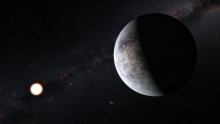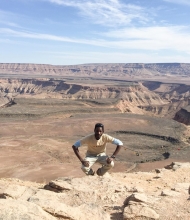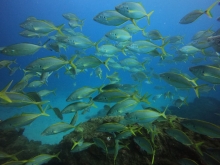Millions of people die prematurely every year from diseases and cancer caused by air pollution. The first line of defence against this carnage is ambient air quality standards. Yet, according to researchers from McGill University, over half of the world’s population lives without the protection of adequate air quality standards.


Office of Science Education Communications Assistant Brent Jamsa sat down with four students to discuss their upcoming presentations at the second annual Undergraduate Poster Showcase. This year, the highly-anticipated event will be hosted on March 16, 6-8 PM EST via Zoom. Register here to attend: https://mcgill.ca/x/odx.

Many species might be left vulnerable in the face of climate change, unable to adapt their physiologies to respond to rapid global warming. According to a team of international researchers, species evolve heat tolerance more slowly than cold tolerance, and the level of heat they can adapt to has limits.
| ANALYSIS |
Lucia Wang, master’s student in Pharmacology and Therapeutics at McGill, shares her perspective on the role of equity, diversity, and inclusion in STEM education.

Mini-Neptunes and super-Earths up to four times the size of our own are the most common exoplanets orbiting stars beyond our solar system. Until now, super-Earths were thought to be the rocky cores of mini-Neptunes whose gassy atmospheres were blown away. In a new study published in The Astrophysical Journal, astronomers from McGill University show that some of these exoplanets never had gaseous atmospheres to begin with, shedding new light on their mysterious origins.

Economic growth is often prescribed as a sure way of increasing the well-being of people in low-income countries, but a study led by McGill and the Institute of Environmental Sciences and Technologies at the Universitat Autònoma de Barcelona (ICTA-UAB) suggests that there may be good reason to question this assumption. The researchers set out to find out how people rate their subjective well-being in societies where money plays a minimal role, and which are not usually included in global happiness surveys.

By Véronique Brulé (Office of Science Education)

For decades, scientists have wrestled with rival theories to explain how interactions between species, like competition, influence biodiversity. Tracking microbial life across the planet, researchers from McGill University show that biodiversity does in fact foster further diversity in microbiomes that are initially less diverse. However, diversity rates plateau with increased competition for survival and space in more diverse microbiomes.

Have you been wondering how to increase equity, diversity, and inclusion (EDI) within your McGill communities? If yes, you may be inspired by reading about an event that one department, Earth and Planetary Sciences, has initiated as a way to open conversations and to learn what it’s like to be an international graduate student in Canada. Perhaps you’ll even have ideas about activities that would benefit your own department.
By Meghomita Das

The core mass of the giant exoplanet WASP-107b is much lower than what was thought necessary to build up the immense gas envelope surrounding giant planets like Jupiter and Saturn, according to a Canadian-led team of astronomers, including McGill University Professor Eve Lee.

Warming ocean waters could reduce the ability of fish, especially large ones, to extract the oxygen they need from their environment. Animals require oxygen to generate energy for movement, growth and reproduction.
Grants available for faculty at Canadian postsecondary institutions
Important: Please contact the International Engagement Unit - international.provost [at] mcgill.ca - to obtain the application form, budget sheet and privacy statement.
- Academic conferences and symposia
- Academic seminars and lectures
- Faculty of Agricultural and Environmental Sciences
- Faculty of Arts
- Faculty of Engineering
- Dental medicine and oral health sciences
- Faculty of Education
- International
- Faculty of Law
- Medicine and Health Sciences
- Faculty of Religious Studies
- Faculty of Science

The Faculty of Science is celebrating McGill’s 200th anniversary with a student art exhibition on the theme of “Science!”. McGill students at all levels and all faculties are invited to submit works in any medium, expressing what science means to them.
Faculty of Science bicentennial committee member, Torsten Bernhard, says the aim of the exhibition is to celebrate science in all its forms.
- Dept. of Anatomy and Cell Biology
- Art Exhibit
- Dept. of Atmospheric and Oceanic Sciences
- Dept. of Biochemistry
- Dept. of Biology
- Dept. of Chemistry
- School of Computer Science
- Dept. of Earth and Planetary Sciences (EPS)
- Dept. of Geography
- Dept. of Mathematics and Statistics
- Dept. of Microbiology and Immunology
- Dept. of Pharmacology and Therapeutics
- Dept. of Physics
- Dept. of Physiology
- Dept. of Psychology
- Redpath Museum
- Faculty of Science

To stop biodiversity loss, Canada recently committed to protecting 30% of its land and sea by 2030. But making conservation decisions about where to locate new protected areas is complicated. It depends on data both about biodiversity and about a range of benefits (e.g. freshwater, climate regulation, recreation) that people get from nature. Surprisingly, despite the size of the country, new mapping suggests that less than 1% of Canada’s land (0.6% of total area or approximately 56,000 km2) is a hotspot, providing all these benefits in one place.

The Living Library: Teaching Strategies from McGill Classrooms is a new initiative from the Office of Science Education to support faculty with planning and delivering courses.
